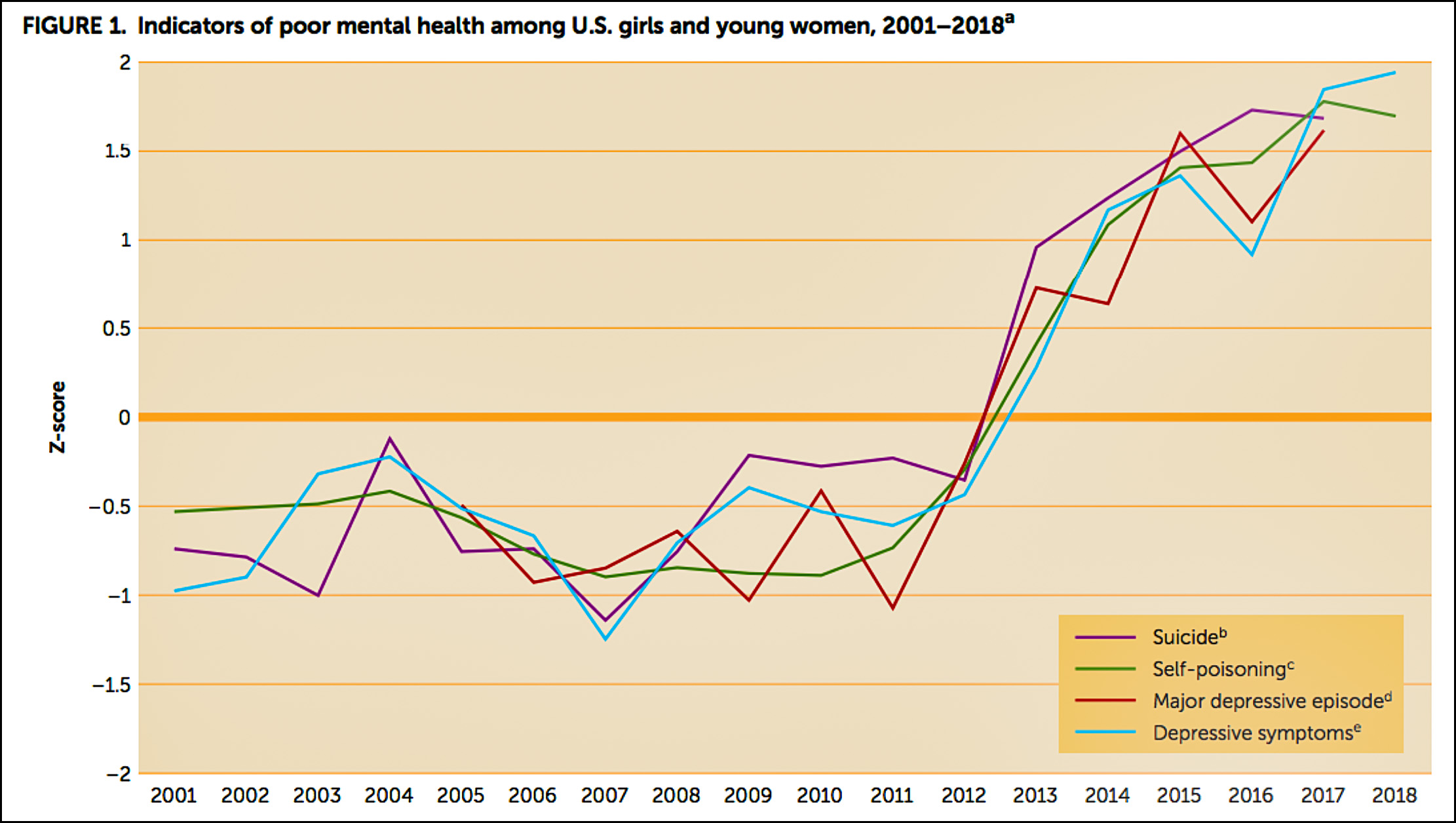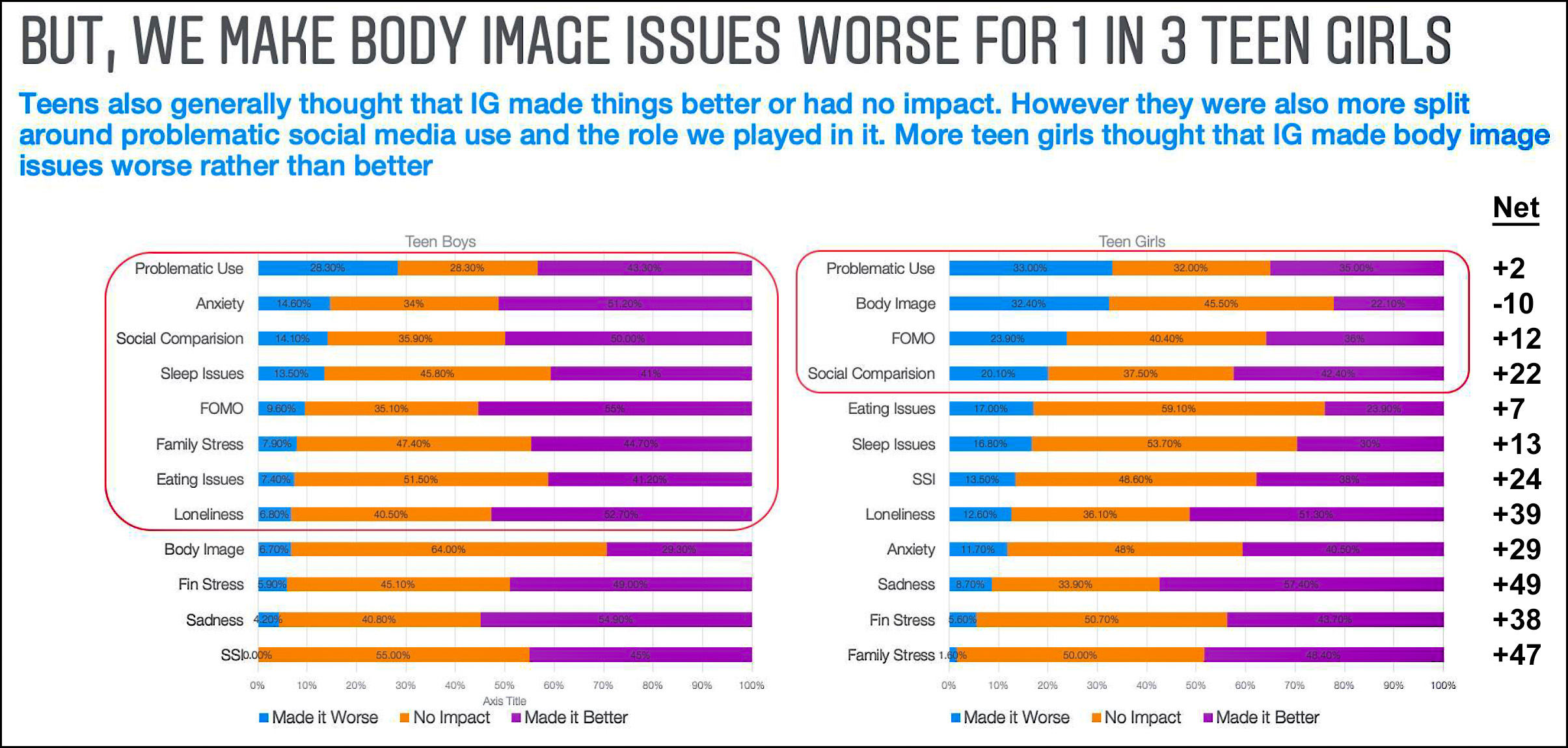A while ago I asked if there were any academic types who had written a good summary of all the research about the impact of social media on teenage users. At least, I think I did. Maybe I only thought about doing it, because I can't find it now. [Ah, here it is.]
In any case, it turns out that Jonathan Haidt and Jean Twenge have been compiling a list of research papers on this subject for the past couple of years. This prompted Haidt to write a piece for the Atlantic titled "The Dangerous Experiment on Teen Girls." This article is very specifically about Instagram, not social media in general, and his argument goes approximately like this:
- Gen Z teen girls have been reporting increasingly high rates of anxiety and depression.
- This started happening between 2010-14, exactly the time that Instagram use became nearly universal among teens.
- In a 2017 survey by British researchers, teens rated Instagram as the most harmful of all social media platforms on measures of anxiety, loneliness, body image, and sleep.
- No other explanation for the rise in teen mental health problems makes sense.
By itself, this is not the most persuasive argument I've ever read. However, we can learn more by looking at the Haidt/Twenge list of research papers.
First off, they found 29 studies that showed an association between social media use and teen mental problems. They also found 11 studies showing no association.
This is moderately persuasive, though a 72% hit rate isn't conclusive. A bigger problem is that the studies almost all found that effects kicked in only among teens who used social media a lot (4-5 hours per day or more). This immediately raises the question of whether (a) social media causes mental health problems or (b) teens with mental health problems seek out social media more obsessively.
This is an obvious question, and in a separate section Haidt and Twenge highlight studies designed to test causality. Most of them are experiments where teens are asked to eliminate (or cut back) social media use for a few weeks. At the end of the experiment their mood was compared with that of a control group that made no changes. Of the 13 "true experiments" they found, eight showed a causal effect and five showed no causal effect. This is suggestive, but even less conclusive than the association studies.
Overall, I'd call this moderately weak evidence. I also had a couple of other problems. This chart, for example:
 This shows an astonishing jump in mental health problems between 2011 and 2013. It hardly seems possible that anything could cause such a huge spike in a mere 24 months, and certainly not a mere 10-20 point increase in the number of teens using social media. This makes me wonder if there's some kind of artifact in the reporting of mental health problems.
This shows an astonishing jump in mental health problems between 2011 and 2013. It hardly seems possible that anything could cause such a huge spike in a mere 24 months, and certainly not a mere 10-20 point increase in the number of teens using social media. This makes me wonder if there's some kind of artifact in the reporting of mental health problems.
My other problem was Haidt's reference to the recently leaked Facebook documents as support for his thesis. But as I've pointed out before, there's no there there:
 Among teen girls, Instagram has a net negative effect on one thing (body image) and a net positive effect on everything else. This simply doesn't support the argument that Instagram is an overall problem for teen girls.
Among teen girls, Instagram has a net negative effect on one thing (body image) and a net positive effect on everything else. This simply doesn't support the argument that Instagram is an overall problem for teen girls.
All this said, there's enough evidence here that it certainly suggests some caution is probably in order. And as it turns out, Haidt makes three proposals that are suitably cautious in turn. First, he wants social media companies to allow academic researchers access to their data. Second, he wants the age of "internet adulthood" to be raised from 13 to 16. Finally, he wants to encourage a norm among parents and schools of delaying use of social media until high school. None of these strike me as objectionable given the suggestive evidence we have.
Obviously research on social media and mental health is difficult to do well. Nevertheless, if we're going to act responsibly instead of moving straight to our usual panic phase, we need something better than what we have now. In particular, we need a more thorough explanation of what happened in the 24 months between 2011 and 2013. Beyond that, we need higher quality studies of how social media affects teens, ideally using something better than self-reported hours of internet use (which is highly unreliable) and self-reported survey questions of mental health (also not terribly reliable). Let's get cracking, researchers!

"It hardly seems possible that anything could cause such a huge spike in a mere 24 months"
If you can, sure, look into the underlying data. But don't disbelieve the data just because it's showing something you find unexpected.
Yes, and without knowing what "Z-score" is supposed to mean, I have no idea how big a change we're looking at.
I bet William Bratton, Rudy Colludy, & Edward O. Wilson reacted similarly to the allegation that lead was the primary driver of crime, too.
Re: body image problems in teenage girls.
Hey! That's a big money maker. Always has been. The women's "beauty" industry. Make 'em feel inferior to a photoshopped image of perfection, tell 'em if they buy your product it'll help, and the bucks just roll in! Clothing. Makeup. Hair products and styles. Quick weight loss schemes. You name it, they'll buy it ... but only if you've convinced them that there's something wrong with them.
Marketing 101. Bad mental health drives sales!
Listen! How else is recent divorce Dave Portnoy going to get laid if there are no eighteen year old girls/young women with low self-esteem driven by issues of bodily inadequacy?
>> Are we conducting a “dangerous experiment” on teen girls?<<
Muah-HaHaHa!
Sounds like Robert Rodriguez could write a horror revenge flick -- think Promising Yung Woman, but less rapey -- about this for his Blumhouse comeback film.
I know folks will tut, tut the idea that raising the age at which parents should be allowed to have their kids register for something like Insta to 16 will not make much of a difference in relieving some of the pressures faced by teen girls due to sites like Instagram, but I think it can't hurt.
We always hear the saying that girls mature faster than boys, and a girl at age 13 is in a much different headspace than a girl who is 16 and much closer to being on the cusp of adulthood.
Quite a few 16 years old girls are intelligent enough and more secure in their image of themselves at the 16 years of age point vs 13 so the peer pressure effect of instagram that causes them to chase acting and looking like, as an example, an "influencer" on Instagram would be much less likely to effect them.
Of course, FB who owns Instagram will not let this happen, it would remove a massive base of users from their platforms and the folks who advertise on FB/Instagram would also howl loud enough to be heard on the moon if the "internet age" in the U.S. shifted from 13 years of age to 16 years of age. FB/Insta would lose at least hundreds of millions in revenue if this happened, so unfortunately, the 16 years old to register for sites like Instagram idea is dead in the water.
I'm with you. As disgusting as online communities may seem to older folks like me, who may not really immerse themselves in many of them, I fear their influence over under-16's who might not be getting as much balance from in-person socialization as older generations are.
How would you actually go about delaying? It seems impossible
Zuck also needs to get them while their yung... Priscilla ain't staying with him forever.
Do the natural experiment yourself. Don't watch, read, or listen to the news or access social media for a week. See what happens.
It's not such a big deal to figure this out.
I'm conflicted. I have TREMENDOUS respect for Haidt but Twenge is idiotic fool any day of the week.
Don't know if this figures into the timing at all, but the new DSM came out in early-mid-2013 and critics warned it would result in an epidemic of mental health diagnoses because of the way the new edition pathologized what were previously considered to be well within the range of normal feelings and emotions. Widespread field trials for new diagnoses were started in 2012. The changes in the section on what constituted major depression was, as I remember, controversial.
That might explain diagnoses, but perhaps not suicides or other self-harm. Though there is some trauma in and of itself of being diagnosed and treated for a mental problem if one is just having normal human emotions. Normal teens then are prescribed drugs which are known to increase suicidal ideation. Just a theory.
This isn’t very helpful I guess. Don’t listen to these kids.
“I literally had a shooting in the alley behind my house,” Jailan Cook, 16, told Joshua Short. He and two other teen males we spoke with — Andre Coleman, 16, and Jayden Randon, 15 — said they’re tired and fed up with all of the violence.
“There’s a gang violence plague everywhere,” Randon said. This, the very reason, so many gathered to talk gun and youth violence. But these teens said it’s not just happening here.
“We’re not saying it’s normal but we see so much violence and hear so much stuff about violence, it does become a part of our every day life,” Coleman said as the meeting continued in a room not too far away.
These teens are around the same ages as those involved in two terrifying shootings near or at Aurora schools last week. Still no word on a motive but police say it’s gang-related.
“It is social media that’s causing this chaos to happen,” Randon said, providing his own perspective on gun violence in general.
Zuckerberg needs fresh, low self-esteem meat for when Priscilla inevitably leaves him.
What better way than to start tenderizing the future ex-Mrs. Zuckerbergs when they are in adolescence & have mushier, less developed brains?